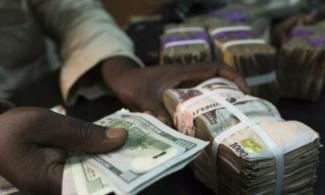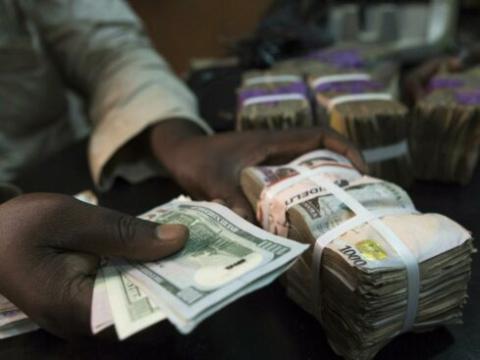
Customers’ access to forex, placing a cap of $20 per month for online transactions were also said to have been limited by banks.
The Nigerian naira traded at N590 per dollar at the parallel section of the foreign exchange market.
Report showed that the exchange rate on Tuesday stood at N585/$1 and N785/£1 on the black market as against the N582/$1 last Friday, açcording to the Punch.

Customers’ access to forex, placing a cap of $20 per month for online transactions were also said to have been limited by banks.
According to Punch, economists have also warned that the rising cost of production due to the forex shortage would lead to inflation as businesses would be forced to hike the cost of goods.
An economist and a senior lecturer of Economics at the Pan Atlantic University, Dr Olalekan Aworinde, said manufacturers would be greatly affected by the issue of dollar scarcity
He said that this crisis would worsen inflation and negatively affect the Gross Domestic Product.
Also an economist and CEO of Centre for the Promotion of Private Enterprise, Dr Muda Yusuf, lamented that the country has been suffering from this issue for a while, with many manufacturers patronising the parallel market at expensive rates.
He added that this would further heighten the country’s inflation rate.
“The effect of this, first, is that many of the manufacturers have been forced to patronise the parallel market and they are getting the forex at exorbitant rates. Therefore, their costs of production have been increasing. The prices of products have been increasing.
He said, “For some products, the product quality has been declining and quantity reducing so that they can maintain the price and not inflate it much. It is putting a whole lot of pressure on the manufacturing sector and affecting their capacity to create jobs.”
A professor of Economics at the Olabisi Onabanjo University, Ago-Iwoye, Ogun State, Prof Sheriffdeen Tella, urged the CBN to intervene in order to curb the adverse effects of the dollar scarcity.
He said, “It is dangerous to our indigenous companies because they are not able to produce at an optimal level. Some people may end up getting sacked, which would increase unemployment. Eventually, the country will go back to recession. The CBN needs to intervene.”
Responding to the claims, the CBN, through its spokesperson, Osita Nwasinobi, advised those manufacturers to formally write the apex bank about their complaints.
He said, “Any manufacturer that feels that he or she is not getting adequate Forex can formally write to the CBN to communicate their complaints. As you well know these manufacturers source their Forex from banks and not from the CBN.”